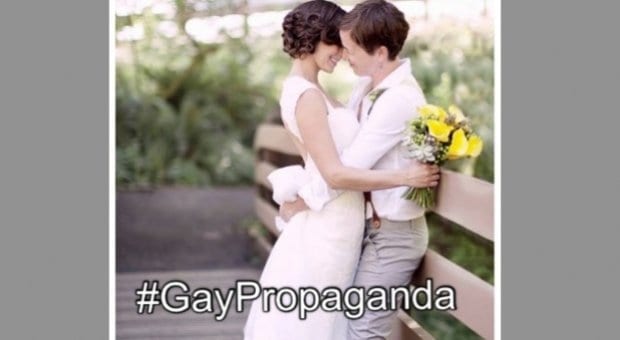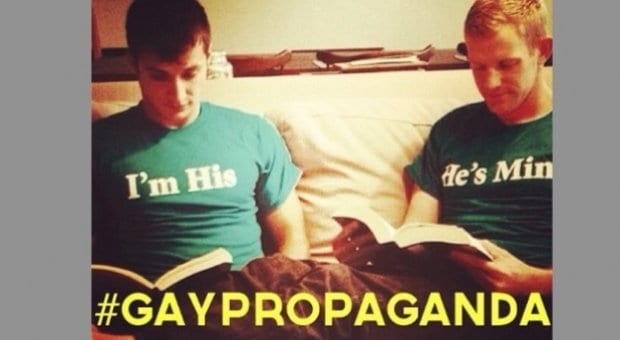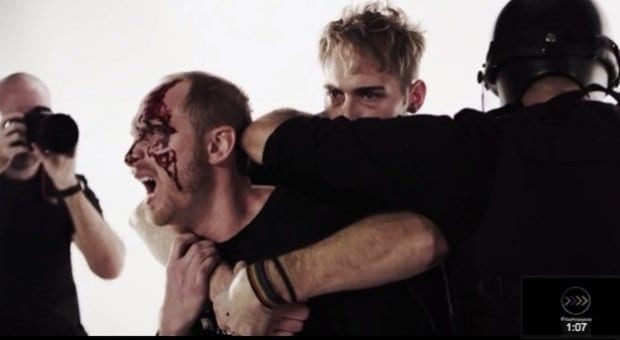
The #GayPropaganda campaign invites people to share their photos and stories on social media platforms like Tumblr in a bid to reclaim and redefine the term "gay propaganda." Credit: wearegaypropaganda.tumblr.com

"Anyone out there can connect an image, a story, a video, a piece of their life that they express on social media with that hashtag and tell a sort of global story of what gay propaganda is that isn’t based in fear and anger and violence and a really backwards notion of love and relationships,” #GayPropaganda's Joe Babarsky says. Credit: wearegaypropaganda.tumblr.com
In just over a minute, “The Scream” unfolds like a silent, stylish news broadcast providing a snapshot of a bloodied protester in the throes of a violent arrest.
Producer Clay Pruitt says the use of the “slow, high-frame rate, almost moving still image” technique humanizes the scale of the horrific event.
“These are real people; this is really happening,” he says, noting that the photographs central to the video were taken in Russia.
“We want to invite the question ‘What if this was your friend, what if this was your neighbour? What if it was some other aspect of this person’s life — their race, religion — that was the reason they were being treated like this?” colleague Joe Babarsky elaborates.
Released Nov 21, “The Scream” is one of a series of video-based public service announcements produced by the (We Are) #GayPropaganda campaign that Babarsky, Pruitt, Kevin Dolan and other like-minded social-media-savvy professionals are spearheading in a bid to build a free-form, global coalition-by-hashtag.
Babarsky says he and co-founder Dolan were motivated to launch the campaign after seeing a “flood of images” of the violence that LGBT people confronted as they staged Pride marches or rallied for their rights in various Russian cities. Just as catalytic for the pair was the uproar those scenes caused within their network of people, who were affected by what they were seeing but felt powerless to act or make their voices heard in Russia.
“In my mind, I immediately landed upon the law that had been passed, the gay propaganda law, and really thought about what it meant,” Babarsky says.
Section 6.21 of the federal law, which Russian President Vladimir Putin enacted in June, characterizes propaganda of “non-traditional sexual relations” as “spreading information in order to form non-traditional sexual desires in children, describing such relations as attractive, promoting the distorted understanding of social equality of traditional and non-traditional relations and also unwanted solicitation of information that could provoke interest to such relations.”
Foreigners found to have flouted the law face the prospect of 15 days in prison and deportation.
Looking at the reach of the law, and Russian authorities’ ability to invoke it to try to silence those who speak out in defence of gay rights and relationships, Babarsky says he realized that almost every interaction in his everyday life could be considered an act of gay propaganda.
That’s when he seized upon #GayPropaganda in a bid to reclaim and redefine the term. With a team of 10 to 15 others, Babarsky deployed it on various social media platforms, including Instagram, Facebook, Twitter and Tumblr, noting that the campaign also has a small presence on the Russian social networking site VK.com that they hope to foster.
“It’s a democratic thing. Anyone out there can connect an image, a story, a video, a piece of their life that they express on social media with that hashtag and tell a sort of global story of what gay propaganda is that isn’t based in fear and anger and violence and a really backwards notion of love and relationships,” Babarsky says.
“We’ve seen people from all over the world join and tag their photos and speak out, and that includes Russia.”
Babarsky says that while the term “gay propaganda” was pervasive in news coverage, he was surprised when he began his online search that there were so few social media posts that initially used it.
“On Instagram, when we started, there were literally, I think, fewer than 10 posts that included it. That was only a few weeks, months ago,” he says, noting that its use has been growing steadily.
For Babarsky, the campaign stands at the headwaters of where it could potentially go; he says he is open to suggestions from its community of supporters.
“We want it to be able to reach anywhere. Whatever story people have to tell, whether it’s about being upset and wanting to make their voice heard, or whether it’s about showing gay people around the world who are persecuted, facing violence or feel that they don’t have hope, the many places in the world where people stand in solidarity with their immediate situation.”
He says public service announcements like “The Scream” are another tool to convey the campaign’s message in a strong, emotional way. The second, titled “The Flag,” was released Nov 28.
“We are offering it up to people to react to it, watch it, share it and do with it what they will. Just as we’re giving them tools in the form of a hashtag, we’re giving them a tool in the form of this video as well.”
Asked about the concrete impact that a social-media-driven campaign can make, Babarsky says there is real value in what might be seen as a casual action.
“We call it selfie activism. You can laugh it off, but social behaviour is human behaviour. It becomes the digital and virtual representation of how people act and what their priorities are, what their passions are,” he says.
“Part of being this new global society means that our conversations and our priorities can be expressed in a public forum or in a direct forum through social [media] as well. We feel it’s important to be counted, to be able to say there are thousands, look at these millions of people, who have raised their hand and said, ‘I care passionately about this, and I will continue to join in this global conversation.’”


 Why you can trust Xtra
Why you can trust Xtra


